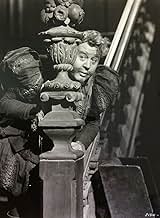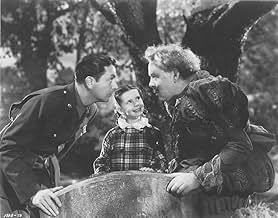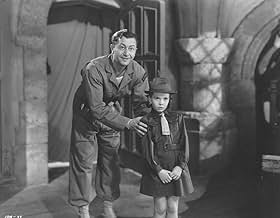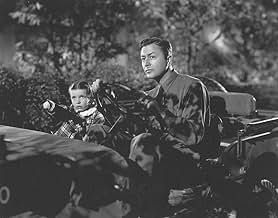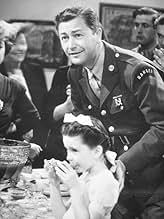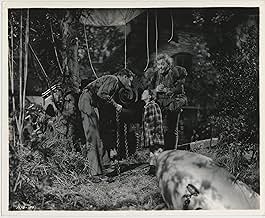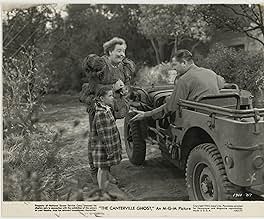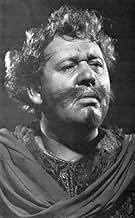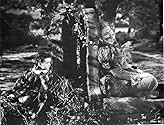IMDb RATING
6.9/10
3.5K
YOUR RATING
The descendent of a ghost imprisoned for cowardice hopes to free the spirit by displaying courage when under duress.The descendent of a ghost imprisoned for cowardice hopes to free the spirit by displaying courage when under duress.The descendent of a ghost imprisoned for cowardice hopes to free the spirit by displaying courage when under duress.
- Directors
- Writers
- Stars
- Awards
- 1 win total
Rags Ragland
- Big Harry
- (as 'Rags' Ragland)
Harry Allen
- Mr. Cawthorne at Party
- (uncredited)
- Directors
- Writers
- All cast & crew
- Production, box office & more at IMDbPro
Featured reviews
Peter Lawford's part in the beginning of the movie was unusual in that he first seems to be an effeminate young fellow picking flowers rather than joining in with the manly deer hunt and then we find he has a lady in there with him, and not his lady. Conveniently, he says his sword arm is sliced to the bone, although it doesn't look all that bad, and he passes the duel on to his unfortunate kinsman who is later walled up by his father. When we learn that the entire family line was made up of cowards it puts a different complexion on everyone's actions and makes for an adult sort of kids' movie. (It seems that cowardice was either common in that region or the other party in the duel was some sort of relative, too.)
What we and O'Brien and Young's characters learn in this movie is that courage is mind over matter not genetics and that anyone old or young can be terrified but not everyone folds like a cheap card table, whether confronted by a ghost or the enemy. Young teaches it to O'Brien and she later has to remind him of it. That is good to keep in mind in any era but especially in wartime when frightening rumors could send people into hysterics rendering them not only useless but dangerous. If the poor ghost had, when alive, stood up to his relatives he could have avoided the dire events. Instead, he ended up cowering in a corner in shame and allowing himself to be bricked in. This story and the Wizard of Oz have a common theme--the way you perceive yourself alters your actions.
What we and O'Brien and Young's characters learn in this movie is that courage is mind over matter not genetics and that anyone old or young can be terrified but not everyone folds like a cheap card table, whether confronted by a ghost or the enemy. Young teaches it to O'Brien and she later has to remind him of it. That is good to keep in mind in any era but especially in wartime when frightening rumors could send people into hysterics rendering them not only useless but dangerous. If the poor ghost had, when alive, stood up to his relatives he could have avoided the dire events. Instead, he ended up cowering in a corner in shame and allowing himself to be bricked in. This story and the Wizard of Oz have a common theme--the way you perceive yourself alters your actions.
Jules Dassin directed this adaptation of Oscar Wilde's story, a charming fantasy about the ghost of a coward haunting an English castle, aided by a relative who must perform a heroic deed to save the spirit from eternal misery. Despite a reportedly troubled production, the cast (including big scene-stealer Charles Laughton and little scene-stealer Margaret O'Brien) glides through it blithely, and Dassin's handling of the material is efficient, if perhaps a tad colorless. Robert Young and Peter Lawford are interchangeably bland, but there are some pleasurable moments. Perhaps not the most memorable apparition-laden comedy, but an enjoyable entry in the genre. **1/2 from ****
Charles Laughton who made a career of playing tortured and twisted men goes one better here as Sir Simon de Canterville who haunts stately Canterville Manor until another Canterville performs a heroic deed and frees him from being earthbound.
The first part of the film shows the incident where Sir Simon turns tail and runs from a duel he got involved in. Out of shame and embarrassment, his father bricked him up in a room in the manor and pronounced the aforementioned curse upon him.
Breaking that curse is easier said than done because the cowardice was passed down several generations from Stuart England to World War II.
Enter a platoon of American rangers quartered at the manor house where the current lady of the manor, Margaret O'Brien is like so many in Great Britain in those years, playing host to American GIs. One in that platoon is a distant cousin from America, Robert Young. Will he perform the deed that frees Charles Laughton? Watch the film and find out.
Robert Young and Margaret O'Brien are fine, but it is the multi-talented Mr. Laughton who carries this film. This is a difficult part and only an actor of real talent and skill could carry it off. The comic elements are nicely done, but Laughton also has to project an air of resigned sadness at the fate he's been cursed with. And Mr. Laughton bares the tortured soul of Simon de Canterville for all to see.
This is a story originally written by Oscar Wilde and nicely updated for World War II moviegoers. And it's still a fine piece of film making for today's audience.
The first part of the film shows the incident where Sir Simon turns tail and runs from a duel he got involved in. Out of shame and embarrassment, his father bricked him up in a room in the manor and pronounced the aforementioned curse upon him.
Breaking that curse is easier said than done because the cowardice was passed down several generations from Stuart England to World War II.
Enter a platoon of American rangers quartered at the manor house where the current lady of the manor, Margaret O'Brien is like so many in Great Britain in those years, playing host to American GIs. One in that platoon is a distant cousin from America, Robert Young. Will he perform the deed that frees Charles Laughton? Watch the film and find out.
Robert Young and Margaret O'Brien are fine, but it is the multi-talented Mr. Laughton who carries this film. This is a difficult part and only an actor of real talent and skill could carry it off. The comic elements are nicely done, but Laughton also has to project an air of resigned sadness at the fate he's been cursed with. And Mr. Laughton bares the tortured soul of Simon de Canterville for all to see.
This is a story originally written by Oscar Wilde and nicely updated for World War II moviegoers. And it's still a fine piece of film making for today's audience.
The veteran Charles Laughton and a very young Robert Young team up in this entertaining fantasy about the ghost of Simon de Canterville - condemned to haunt the halls of his family's castle until a descendant performs an act of bravery on his behalf. What's the catch? Simon was condemned by his own father for being a coward, and the Canterville line ever since has been a long line of cowards. (The greatest irony of the movie is that Simon has developed a reputation as the most fearsome ghost in all of England!) Finding a hero among this family won't be easy. Then along comes Cuffy Williams (Young), an American soldier whose platoon is billeted in the castle during the lead-up to D-Day. It turns out that Williams is a very distant descendant of the Cantervilles, and D-Day, of course, will provide the ultimate opportunity to show his bravery and to release Simon from his torment. The question is whether he'll be able to work up the courage to do it!
Laughton and Young offer excellent performances, and the very young Margaret O'Brien (who would have been about 7 when this was made) is convincing as Lady Jessica de Canterville. Some of the scenes as the American soldiers try to chase down the ghost to get a picture of him to prove that he exists to their commanding officer are also quite funny. 8/10
Laughton and Young offer excellent performances, and the very young Margaret O'Brien (who would have been about 7 when this was made) is convincing as Lady Jessica de Canterville. Some of the scenes as the American soldiers try to chase down the ghost to get a picture of him to prove that he exists to their commanding officer are also quite funny. 8/10
This review is somewhat biased, as I am an avid Robert Young fan, and have yet to see him in a less than stellar performance. Margaret O'Brien is also splendid, and it is hard to believe so much talent projects out of a six year old girl. Charles Laughton is memorable in his fine delivery of both pathos and comedic skills.
A highlight of the film for me is the music played by the G.I.s. at a local party. Music is classic 40's 8 to the bar, visually punctuated with awesome jitterbugging by the soldiers. A proper female British spectator comments to an incredulous priest, "I believe they call it woogie boogie." It is unknown what what the song title or who the recording artists may have been, however credits list original music for the film as provided by George Bassman.
A highlight of the film for me is the music played by the G.I.s. at a local party. Music is classic 40's 8 to the bar, visually punctuated with awesome jitterbugging by the soldiers. A proper female British spectator comments to an incredulous priest, "I believe they call it woogie boogie." It is unknown what what the song title or who the recording artists may have been, however credits list original music for the film as provided by George Bassman.
Did you know
- TriviaThe bomb that Cuffy and the ghost want to dispose of was known as a "blockbuster", so-called because it was so powerful it could demolish more than a dozen buildings i.e. a city block.
- GoofsWhile many German parachute mines with time delay dropped on England during World War II; but they weren't called blockbusters. The blockbuster was a type of bomb devised by the British. At first a blockbuster was a four thousand pound bomb; but later became an 8000 and then a 12000 pound bomb. They achieved these sizes by simply bolting two or three of the 4000 pounders together. They were called Blockbusters because it was calculated that they could destroy a city block.
- Quotes
Sir Simon de Canterville: Excuse me, I really must gibber at the oriole window.
- ConnectionsFeatured in Cineficción Radio: Lo fantástico (2020)
- SoundtracksBless 'em All
(uncredited)
Written by Fred Godfrey (1917)
Revised lyrics by Jimmy Hughes and Frank Lake (1940)
Additional lyrics by Al Stillman (1941)
Sung a cappella by the soldiers
- How long is The Canterville Ghost?Powered by Alexa
Details
- Release date
- Country of origin
- Language
- Also known as
- El fantasma de Canterville
- Filming locations
- Production company
- See more company credits at IMDbPro
- Runtime
- 1h 35m(95 min)
- Color
- Aspect ratio
- 1.37 : 1
Contribute to this page
Suggest an edit or add missing content



